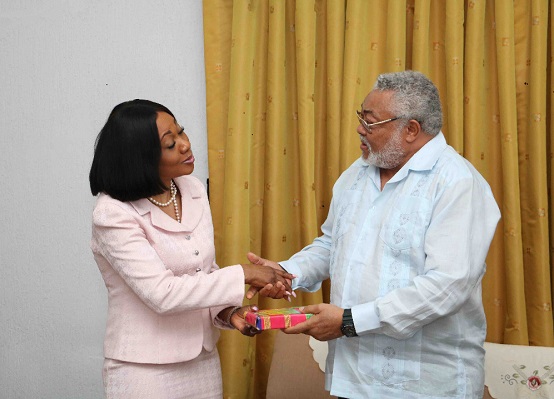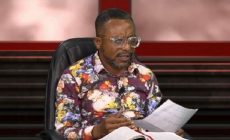Rawlings lauds integrity of EC Chairperson
- Posted on
- Comment
 Former President Jerry John Rawlings has lauded the integrity of the Chairperson of the Electoral Commission (EC), Mrs Jean Mensa, and the reforms being undertaken to safeguard the integrity of the electoral process.
Former President Jerry John Rawlings has lauded the integrity of the Chairperson of the Electoral Commission (EC), Mrs Jean Mensa, and the reforms being undertaken to safeguard the integrity of the electoral process.
“You are known for your integrity and your appointment into this job did make a number of people uncomfortable,” the former President said.
Addressing a delegation from the EC, led by the chairperson who had called on him at his residence at Ridge in Accra, the former President told the EC leadership that they were occupying a very important position because “we are dealing with the direct access to power of the people and it is important that everything is done to maintain the sanctity of that which is right.”
Maintaining the sanctity
That, he said, was what would ensure the stability and the acceptance of the results of the electoral process.
That way, he said, winners and losers would accept their situations, when and if they knew that the process had been carried out with utmost integrity.
Such an outcome, he pointed out, would be “good for the government, good for the winner and good for the loser.”
Former President Rawlings stated that it was not easy to maintain that kind of integrity these days “because we all know what we’ve been doing in our own electoral processes within our party structures and our party machineries, when monies have been used left and right to disenfranchise our own people.”
Double standards
That practice within the very structures of the political parties, he said, had taken away “some of our own power as a political entity” and yet, “that is what they are demanding when it comes to the national process.”
“So, you have quite a task because some of us have undermined and defiled that sanctity within our own chamber, and so the kind of support that we could have given to the central, national election, is a bit faulty and it makes the burden heavier but you have no choice,” he added.
The former President posited that the people who tended to misbehave or plot such acts were not in the majority and that was why it was proper for the mass of the people, who formed the majority, to know the thinking process of the higher ups in the EC.
“The sanctity of the right of choice is something that must be preserved. Freedom and justice is not abstract. It is very much related to the sanctity of the right of choice,” he reiterated.
“Bringing on board the reforms of the electoral process by the new administration of the EC, was an expression of what you stand for” he told the EC Chair and stressed that it was important that the national electoral office, as well as its projects and programmes, reflected what its chairperson stood for.
The visit to former President Rawlings formed part of an engagement by the EC with stakeholders in the electoral process to appraise them of the various reforms being undertaken by the commission to ensure the smooth run of the country’s electoral processes, as well as take their input for a successful execution of the EC’s mandate.
The EC Chairperson, Mrs Mensa, was accompanied by her two deputies: Dr Eric Bossman Asare and Mr Samuel Tettey.
Reforms for more transparency
Mrs Mensa, also briefed the former President on activities the commission had undertaken since the current leadership took over and expressed confidence in the reforms that had been undertaken which was aimed at bringing the transparency of the EC’s processes to the fore.
That, she said, would engender trust in the EC and ensure that there was an across the board patronage of all the activities of the EC towards the success of its programmes.
She also briefed the former President on the line-up of activities of the EC for 2019 and the general elections in 2020.
Place Ghana first
For his part, Dr Benjamin Kunbour, a former Member of Parliament (MP) for the Nandom Constituency and the representative of the National Democratic Congress (NDC) on the Representative of the People’s Amendment Law (ROPAL) committee of the EC, who re-echoed the sentiments of former President Rawlings, said the practice of using dubious means to win positions by individuals within their own political parties had predisposed them to have same mentality against the EC over the years.
He, therefore, urged all political players to put their individual ambitions and considerations aside and rather place the national interest first.
If for nothing, he said, cues must be taken from countries within the sub-region that had slipped into chaos as a result of the subjugation of the national interest in favour of selfish, individual and parochial interests.
-Graphic










 (Selorm) |
(Selorm) |  (Nana Kwesi)
(Nana Kwesi)